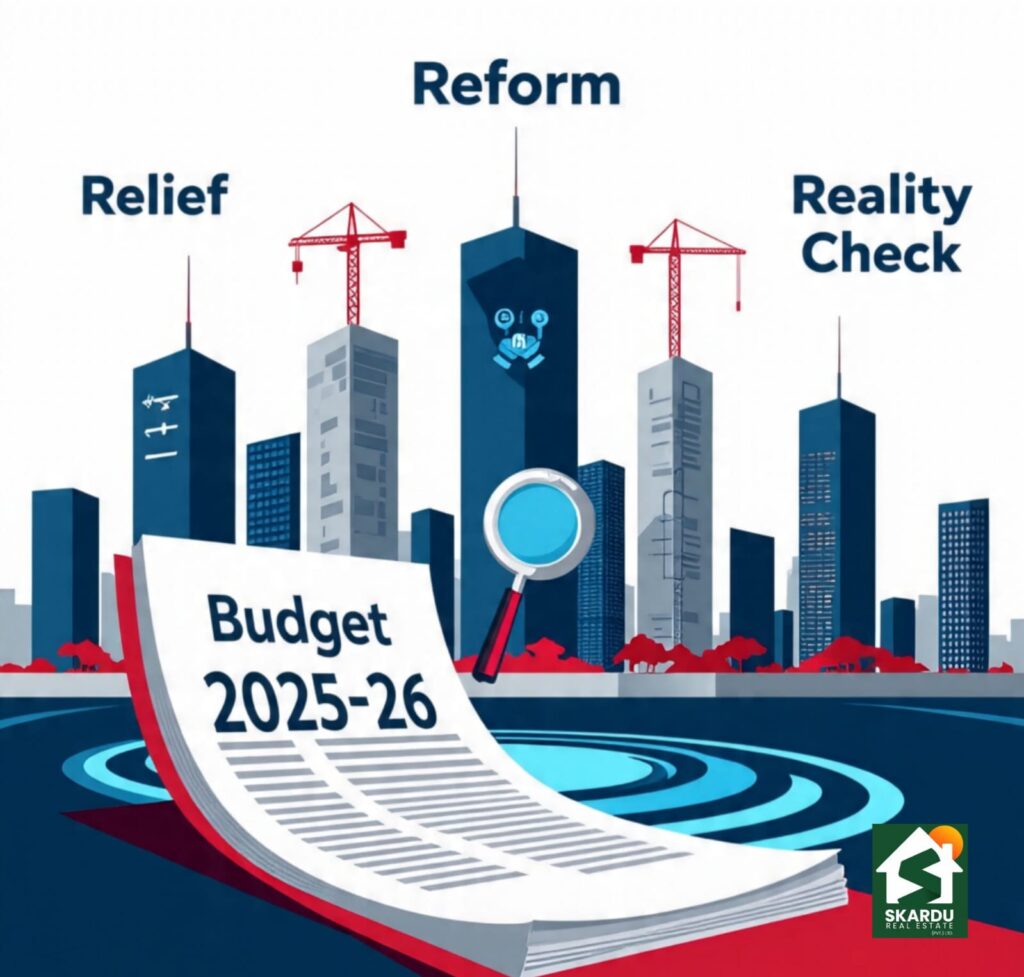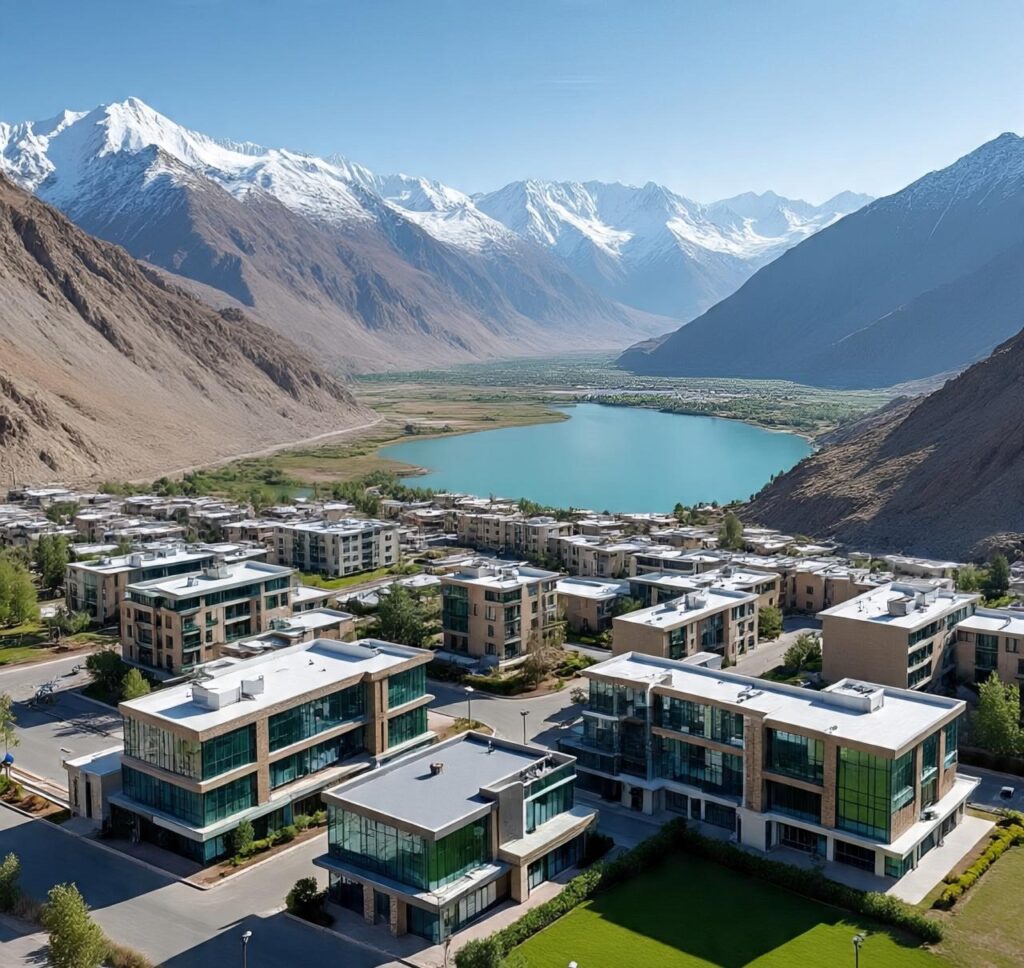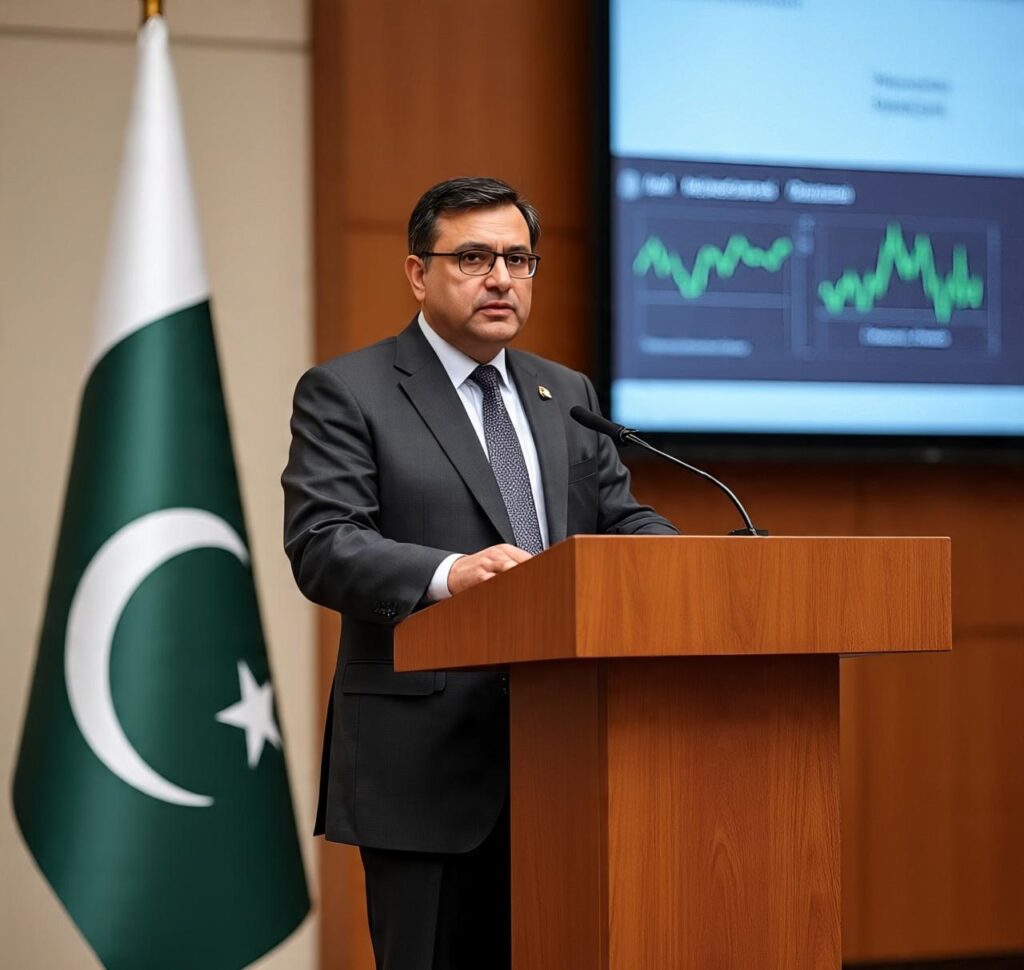Budget 2025-26 has sent ripples through every sector, but perhaps none feel the tremors more intensely than real estate. For investors, developers, and aspiring homeowners across the nation, this budget presents a potent cocktail of promising opportunities and daunting challenges. At Skardu Real Estate, we dissect the key proposals, focusing squarely on “Real Estate, Reform, and Relief,” translating the numbers into tangible impacts in Pakistani Rupees (PKR). Will this budget fuel a market boom or trigger a cautious bust? Let’s explore.

The Beacon of Hope: Relief and Potential Boom
The government has signaled a clear intent to stimulate economic activity, with real estate as a potential engine. Key positive signals include:
1. Capital Gains Tax (CGT) Adjustment (A Major Win):
The Reform:
Significant rationalization of CGT on property sales. The holding period for exemption has reportedly been reduced. While the exact new structure requires official confirmation, strong indications point towards a shift from the previous 6-year tiered system to potentially 4 years or less for full exemption. Rates for properties sold before the exemption period may also see moderation.
The Relief & Boom Potential (Impact):
Imagine selling a plot in Islamabad purchased for PKR 1 Crore. Under harsh previous regimes, selling within 1-2 years could have attracted CGT up to 39% (PKR 39 Lakh!). A streamlined system with a shorter exemption period (e.g., 3 years) and lower rates (e.g., 15% max) drastically reduces this burden. This unlocks liquidity, encourages property flipping for quicker market movement, and makes real estate a more attractive short-to-medium-term investment again. Expect increased transaction volumes, particularly in developed urban areas.
2. Focus on Affordable Housing (Targeted Relief):

Renewed emphasis and potentially increased budgetary allocations for schemes like Naya Pakistan Housing Programme (NPHP). Proposals for easing regulations and providing incentives for developers building in the low-to-middle-income segment.
Directly addresses the housing shortage for the masses. Incentives for developers could translate into projects offering units in the PKR 3-5 Million range, significantly below current market averages in major cities. Government subsidies or tax breaks for buyers within specific income brackets (e.g., waivers on stamp duty for first-time buyers of properties under PKR 5 Crore) would be a major relief, boosting demand in this crucial segment.
3.Infrastructure Development (Indirect Boom Catalyst):
Substantial allocations (expected in the hundreds of Billions of PKR) for critical infrastructure projects – roads, bridges, utilities (water, gas, electricity).
Enhanced infrastructure dramatically increases the attractiveness and value of land in developing areas and suburbs. A PKR 500 Billion highway project connecting a new suburb to a major city can transform land values there from PKR 5,000 per sq yd to PKR 15,000+ per sq yd within a few years, creating significant wealth for early investors and opening new frontiers for development.

3.Infrastructure Development (Indirect Boom Catalyst):
Despite the positives, significant hurdles and potential negative triggers remain:
1.Withholding Tax (WHT) Complexity (Ongoing Burden):
Despite the positives, significant hurdles and potential negative triggers remain:
The Challenge:
While CGT might be easing, the cumbersome regime of Advance WHT on property transactions (at varying rates for filers/non-filers) persists. This acts as a significant upfront cash flow burden for buyers, often running into hundreds of thousands or even millions of PKR depending on the property value.
The Bust Risk:
High upfront taxes deter entry-level and middle-class buyers, potentially suppressing demand, especially in the mid-market segment (PKR 10-30 Crore properties). Simplification or reduction here is crucial.
2. Economic Stability & Inflation:

The budget operates against the backdrop of high inflation (still hovering around 15-20% YoY) and the need for fiscal consolidation. High borrowing costs (interest rates) make mortgages expensive. A PKR 10 Million mortgage at 18% interest results in crippling monthly payments exceeding PKR 250,000, putting homeownership out of reach for most.
If the budget fails to credibly address macroeconomic stability, leading to sustained high inflation and interest rates, the entire real estate market could stagnate or decline. Investor confidence is fragile, and capital might flee to safer havens.
3. Implementation & Consistency (The Trust Deficit):
Pakistan’s history of frequent tax regime changes and policy U-turns creates uncertainty. Will the proposed CGT reforms stick? Will infrastructure funds be efficiently deployed?
Perceived policy instability is a major deterrent to long-term investment, both domestic and foreign. Investors may adopt a “wait and see” approach, freezing market activity until concrete implementation is demonstrated.

Skardu Real Estate's Analysis: Navigating the Crossroads
The Budget 2025-26 offers vital relief through CGT rationalization and critical reforms focusing on affordable housing and infrastructure. These have the potential to ignite specific market segments (affordable housing, well-located development plots). However, the daunting challenges of high WHT, macroeconomic instability, and policy inconsistency pose significant risks that could dampen or even reverse positive momentum.
What Should You Do?
For Sellers (Especially with properties held 3-5 years): The CGT changes could be your moment. Consult a tax advisor immediately upon confirmation of the final rates to potentially save lakhs or crores in tax if selling soon.
For Buyers Targeting Affordable Housing: Stay vigilant on NPHP updates and specific buyer subsidies. Have your financing pre-approval ready (understanding the high-interest cost).
For Investors: Focus on areas slated for major infrastructure development (budget documents are key!). Factor in the high cost of capital. Due diligence is paramount.
For All: Consult Professionals! Tax laws are complex. Engage chartered accountants and reputable real estate advisors (like Skardu Real Estate) to navigate WHT, CGT, and make informed decisions based on your specific PKR budget and goals.
The Verdict: Cautious Optimism Demands Vigilance
The Budget 2025-26 isn’t a guaranteed boom ticket for Pakistani real estate, nor is it an inevitable bust. It’s a budget of contrasts. The promising reforms and welcome relief, particularly on CGT, provide a solid foundation for recovery in transaction volumes. However, the lingering burdens of WHT and the overwhelming challenge of macroeconomic stability cannot be ignored. Success hinges entirely on consistent implementation and broader economic improvement.
At Skardu Real Estate (Pvt.) Ltd., we believe knowledge is power, especially when dealing in Crores of PKR. Stay tuned for further deep dives into specific budget measures as details emerge. We’re here to help you navigate this complex landscape, turning budget headlines into sound property decisions for your future.

